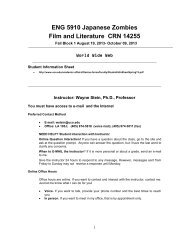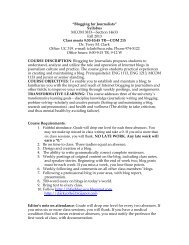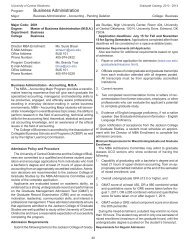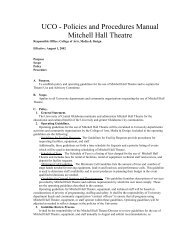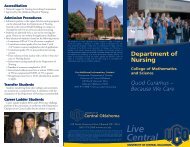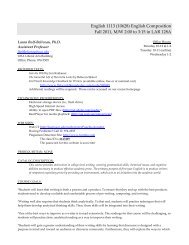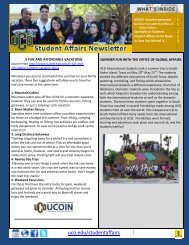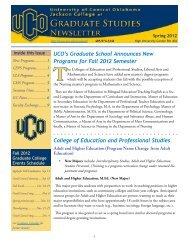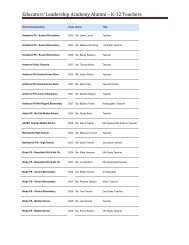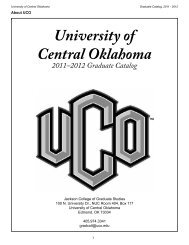Graduate Catalog - University of Central Oklahoma
Graduate Catalog - University of Central Oklahoma
Graduate Catalog - University of Central Oklahoma
You also want an ePaper? Increase the reach of your titles
YUMPU automatically turns print PDFs into web optimized ePapers that Google loves.
<strong>University</strong> <strong>of</strong> <strong>Central</strong> <strong>Oklahoma</strong><br />
<strong>Graduate</strong> <strong>Catalog</strong>, 2012 - 2013<br />
<strong>Graduate</strong> Course Descriptions<br />
PSY 5523 - Child & Adolescent Counseling<br />
This course provides an overview <strong>of</strong> the theories, therapeutic approaches,<br />
and empirically supported treatments specific to working<br />
with children and adolescents. Students will become pr<strong>of</strong>icient in the<br />
legal, ethical, and diversity issues applicable to the diagnosis and<br />
treatment <strong>of</strong> children and adolescents through didactic instruction,<br />
role play and classroom demonstration. Prerequisite(s): PSY 5473<br />
with a minimum grade <strong>of</strong> “B” and written permission.<br />
PSY 5533 - Couples and Family Counseling<br />
This course provides an overview <strong>of</strong> the theories, therapeutic approaches,<br />
and empirically supported treatments specific to working<br />
with couples and families. Students will become familiar with the<br />
legal, ethical, and diversity issues applicable to the diagnosis and<br />
treatment <strong>of</strong> couples and families. The course will employ didactic<br />
instruction, role play and classroom demonstration. Prerequisite(s):<br />
Written permission.<br />
PSY 5543 - Career Counseling<br />
The course provides an introduction to the major career development<br />
and trait theories, career assessment techniques, and empirically<br />
based career counseling techniques. The course emphasizes the<br />
integration <strong>of</strong> theories, techniques, and counseling applications. In<br />
addition to the classroom, the on site counseling laboratory provides<br />
the opportunity for applied practice. Prerequisite(s): PSY 5473 with<br />
a minimum grade <strong>of</strong> “B”.<br />
PSY 5563 - Advanced Social Psychology<br />
This course provides an in-depth study <strong>of</strong> the interaction <strong>of</strong> humans<br />
with their social environment with special emphasis on classic and<br />
current themes and methods <strong>of</strong> social research. Prerequisite(s):<br />
Written permission <strong>of</strong> instructor.<br />
PSY 5623 - Theories <strong>of</strong> Personality<br />
This course will discuss the primary approaches to understanding<br />
personality: psychodynamic, biological/evolutionary, behavior/social<br />
learning, trait, humanistic, and cognitive. For each approach, the<br />
course will review the origins <strong>of</strong> the theoretical approach, discuss the<br />
approach’s assumptions about personality, and examine examples<br />
<strong>of</strong> related research.<br />
PSY 5633 - Modern Learning Theories<br />
This course provides a comprehensive study <strong>of</strong> theories <strong>of</strong> learning<br />
and memory including a historical review and a survey <strong>of</strong> contemporary<br />
cognitive psychology. Prerequisite(s): PSY 4763 and written<br />
permission from psychology chair required.<br />
PSY 5643 - Empirical Basis <strong>of</strong> Therapy<br />
This course is designed to prepare the student for clinical work in<br />
counseling. The course will promote knowledge and understanding<br />
<strong>of</strong> those counseling variables and counseling techniques that are<br />
supported by empirical research. Prerequisite(s): PSY 5473 and<br />
written permission.<br />
PSY 5653 - Forensic Psychology<br />
This course reviews the contribution <strong>of</strong> psychology to the explanation<br />
<strong>of</strong> criminal conduct and the treatment and rehabilitation <strong>of</strong> <strong>of</strong>fenders,<br />
covering basic concepts <strong>of</strong> criminal justice and the study<br />
<strong>of</strong> crime while examining the nature <strong>of</strong> <strong>of</strong>fending from sociological,<br />
psychiatric, and psychological perspectives. It also addresses the<br />
impact <strong>of</strong> crime from the standpoint <strong>of</strong> victims as well as responses<br />
to victims <strong>of</strong> crime.<br />
PSY 5683 - Advanced Counseling<br />
This course provides an in-depth view <strong>of</strong> the theories, therapeutic<br />
approaches, and empirically supported treatments specific to working<br />
with various individual client populations. Students will become<br />
familiar with the legal, ethical, and diversity issues applicable to the<br />
diagnosis and treatment <strong>of</strong> various types <strong>of</strong> individual clients and<br />
diagnoses. The course will employ didactic instruction, role play and<br />
classroom demonstration. Prerequisite(s): PSY 5473 with a minimum<br />
grade <strong>of</strong> “B” and written permission <strong>of</strong> instructor.<br />
PSY 5722 - Introduction To School Psychological Services<br />
This is a course designed to aid school psychometrist and school<br />
psychologists in exploring their role and functions. Ethics for their<br />
discipline, legal implications, current research on assessment <strong>of</strong><br />
children and adults, school placement, classroom management, referral<br />
sources, therapeutic intervention strategies, consultation, and<br />
pr<strong>of</strong>essional affiliation will also be covered. Prerequisite(s): Written<br />
permission from psychology chair required.<br />
PSY 5753 - Advanced SPSS<br />
This course emphasizes coding data for data files, writing SPSS<br />
control files to read the data file, and completing SPSS procedures.<br />
Procedures covered range from basic data transformations to complex<br />
multivariate procedures. Prerequisite(s): PSY 3813; PSY 4383<br />
preferred and written permission from psychology chair required.<br />
PSY 5803 - Individual Testing Techniques-Wechsler<br />
This course is a study <strong>of</strong> the rationale and administration <strong>of</strong> the<br />
Wechsler tests. Emphasis is placed on the administration and diagnostic<br />
uses <strong>of</strong> both adult and children scales. Prerequisite(s): Admission<br />
to the program and written permission <strong>of</strong> instructor.<br />
PSY 5813 - Diagnostic Testing Techniques<br />
This course is a survey <strong>of</strong> diagnostic techniques which deal with sensory<br />
motor skills, language development, and social and emotional<br />
development. Emphasis is placed on the rationale and functions <strong>of</strong><br />
such instruments which would help specialists in reading, counseling,<br />
and psychometry to evaluate those aspects <strong>of</strong> behavior not currently<br />
assessed by traditional testing procedures. Prerequisite(s): PSY 5793<br />
or 5803 and written permission <strong>of</strong> instructor.<br />
PSY 5823 - ABA I: Found in Behavior Analy<br />
This is the foundational course in Applied Behavior Analysis. The<br />
course is designed to cover the basic elements in 10 <strong>of</strong> the 11 core<br />
areas <strong>of</strong> applied behavior analysis. The course focuses on the ethics<br />
and basic characteristics, processes, concepts, terminology, and<br />
learning principles upon which ABA is based. Assessing behavior<br />
and designing intervention outcomes and strategies using principles<br />
<strong>of</strong> experimental evaluation including displaying and interpreting behavioral<br />
data is emphasized. ABA is compared to other explanations<br />
<strong>of</strong> behavior and students are guided in the creation and application<br />
<strong>of</strong> individualized behavioral programs for teaching functional skills.<br />
PSY 5833 - ABA II: App Tech Ap Beh Analy<br />
ABA II: Application <strong>of</strong> Techniques in Applied Behavior Analysis is the<br />
second <strong>of</strong> five courses in the BCBA approved sequence. The course<br />
takes basic ethical foundations and principles <strong>of</strong> ABA articulated in<br />
eight <strong>of</strong> the Core Areas to a higher level <strong>of</strong> understanding and application.<br />
Students are expected to apply knowledge and skill from<br />
both the introductory course and ABA II in the development <strong>of</strong> extensive<br />
training modules for fellow pr<strong>of</strong>essionals using the principles<br />
<strong>of</strong> ABA. Training modules including treatment for all age levels (In<br />
<strong>Oklahoma</strong> that encompasses Sooner Start to Waivered Services<br />
Independent Adult Living). Training design includes ongoing supervision<br />
<strong>of</strong> comprehensive and intense programs for functional behavior.<br />
This course also examines the effects <strong>of</strong> the use <strong>of</strong> psychotropic<br />
medications for behavior control and dual diagnoses (Ex. Mental<br />
Illness and a developmental disability). Prerequisite(s): PSY 5823<br />
and graduate standing.<br />
256





